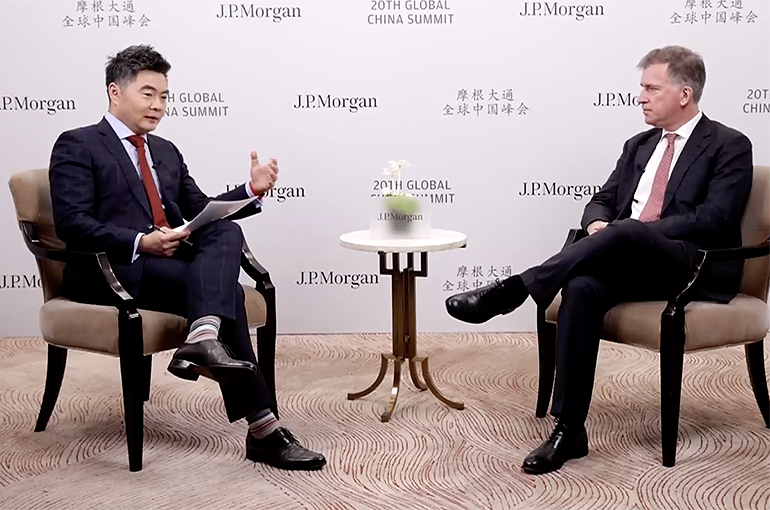
(Yicai) June 7 -- Some gauges indicate that the real estate markets in China’s first-tier cities have reached the lowest point of the cycle, as activity is starting to pick up, according to Christian Stracke, president of US bond manager Pacific Investment Management Company.
Headquartered in California, PIMCO is the world’s largest manager of active fixed income products, with assets under management of USD1.9 trillion as of the end of March.
Stracke, who visited Shanghai last month to take part in J.P. Morgan’s Global China Summit, is also the global head of PIMCO’s credit research group.
Below are excerpts from the interview.
Yicai: What’s your outlook on China this year?
Christian Stracke: If you go back two months ago, the global consensus, at least outside of China, was that the Chinese economy was very weak. I think what we saw in the last few months is very promising indicators of stabilization and recovery. If you look at the purchasing managers indexes in China, they’ve been above 50 for the last few months to show that the sentiment is recovering and activity is recovering.
There have been targeted but important policy steps towards helping the recovery. It’s not what we call a bazooka, it’s not massive policy move to drive stimulus, but the targeted measures seem to be working to help turn things around. We think that the 5 percent target of gross domestic product this year in China is reasonable, maybe it may come a little below 5 percent, 4 or 4.5 percent, but that would be a strong positive upside surprise relative to global consensus just a couple of months ago.
Yicai: Besides that, what are your concerns on Chinese economy?
Stracke: The property market remains quite depressed. But the Chinese authorities are realistic about how you can turn the property market around. This is very common in economic cycles in economies all over the world that you get booms and busts in property markets.
Yicai: How long will it take for the Chinese property market to recover?
Stracke: It will take three to five years for there to be a healthy clearing of the property markets, where there begins to be new construction, new activity, property prices rebounding considerably. That’s a very globally standard time frame of three to five years of very low construction and absorption of the excess supply that is out there. That happens over time, and then resets at a healthy level and picks back up.
Yicai: In terms of the painful property cycle, where are we now?
Stracke: We are hopefully at the bottom. In our trip here in China this week, we heard a number of comments from some of our colleagues and clients, that there are some indicators that things seem to be starting bottom out, particularly in the tier-one cities, where the activity is starting to come back.
Whether we are at the bottom or not in the tier-two, tier-three cities remains unclear, but the recovery will start in the tier-one cities and as it solidifies, it will ultimately spread to the tier-two and tier-three cities. There is not a bottom for China as a whole, you have to focus on different regions. But it is encouraging to see that it seems like there has been some real stabilization in tie-one cities, and ultimately that should spread to the rest of the country. But it will take time.
Yicai: Last month, the Chinese government has launched a series of policies to support the property market to resolve unsold properties. Will they help?
Stracke: I think they will help in the short term and in the long term. In the short term, they will help at the margin. It’s not a massive stimulus, it’s a targeted stimulus. The most important part of the measures is to outright buy properties and turn them into social housing, and it is even more important in the long term. If there is a broadening and deepening in the social housing sector, it will provide more resilient social safety net for those people who need it, and that really helps to address some of the concerns, such as why saving is so high and consumption is so low in China.
It’s because of fears about what could come and whether there is a social safety net to support if there is economic volatility. So broadening social housing system helps to address that confidence question which should have long term implications. In the short term, it will help to stabilize things.
Yicai: You mention some bazooka things. The Chinese authority seems very patient. Do you think the patience will be paid off?
Stracke: Yes, the patience will be paid off. We are in the middle of nature response to over investment. There is a decline in investment, and there will be some healthy conversion of private property into social housing, which is very healthy in the short and long term.
There was too much activity in the property sector, so allowing a natural, healthy re-balancing of the economy, away from property investment into broader and more diversified investment. As the government is targeting right now in terms of things like stimulates for returning old manufacturing equipment into new manufacturing equipment. That is a broadening and diversifying of the economy in a healthy way.
So that patience will be rewarded. It will be difficult for the next few years, but ultimately to go back to the imbalances that previewed for 10 years before the property bust is not really in anyone’s interest in the long term.
Editor: Futura Costaglione